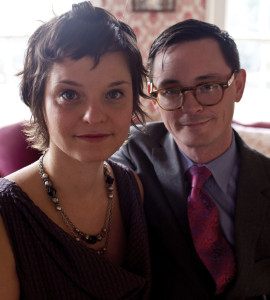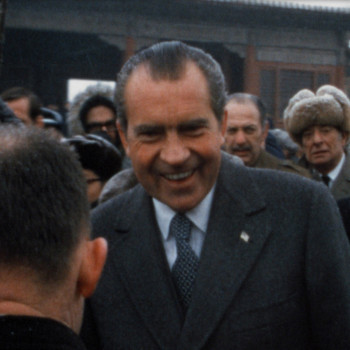Award-winning documentary Penny Lane did not set out to make yet another film playing on Baby Boomer nostalgia. However, when she and her co-producer were tipped off to a collection of archival footage shot by individuals in President Nixon’s inner circle that had never been seen by the general public, she had found a project she couldn’t resist. They guessed there would be a movie somewhere in the twenty-six hours of footage of 1970’s America – and what they got in was a very different image of Richard Nixon and his cronies than we get from the history books. “Our Nixon” recently aired on CNN and is rolling out to theaters nationwide this month.

Rico Gagliano: So, first of all, the question I think a lot of people will ask upon hearing this is, “Really, another movie about Richard Nixon?”
Penny Lane: Yeah, well I would have, three years ago I would have said the same thing. People that know me were surprised by this project because
I spent a lot of time complaining about the narcissism of the Baby Boomer generation, and how they think the 60’s and 70’s were the most important thing that ever happened.
Rico Gagliano: Next is a Bob Dylan documentary.
Penny Lane: What happened was my producer – I co-produced this film with a fellow named Brian Frye – he just heard from a friend that at the National Archives in the public domain were 26 hours of home movie film that had been shot by HR Haldeman, John Lichman, and Dwight Chapin.
They were his staffers, and they were guys who you know, if they’re remembered at all today, they’re remembered because they were Watergate figures. They all go to prison in the end.
Rico Gagliano: Spoiler alert.
Penny Lane: Everybody, don’t listen to this if you don’t want to know how the Nixon presidency ends!
I actually got a bad review from some TV critic who suggested that I should have changed the ending. And I was like, well…
Rico Gagliano: Not much I can do about that.
Penny Lane: So, Brian brought the home movies, and the problem was that they had never been transferred info a format where the general public could see them. Brian and I decided to have all 26 hours transferred so we could see it. It was about $20,000. And we just guessed. We were like, there’s probably some kind of movie in there. And luckily there was.
Rico Gagliano: It turns out there was. There is, I mean it’s interesting that you would be somebody who doesn’t like Baby Boomer nostalgia, because there is kind of a sense of nostalgia in the film. The 70’s styles, there’s pop music that you weave through the whole thing, there’s Super 8 footage of the pope, William F. Buckley shows up for a shot or two, the Apollo 11 rocket lifting off for the moon… What was your favorite piece of footage that you uncovered, just kind of the most delightful?
Penny Lane: We happened to find an odd – because these Super 8 films are silent – we happened to find a synced audio track for one moment of these 26 hours, where Nixon is just visiting some people in Idaho Falls, Idaho, and a bunch of kids dressed up in patriotic outfits start to sing a song to him that, I don’t know, I think a high school chorus teacher wrote. And they sing this song about how they’re Americans, and they hope that you are too, and it just says so much about patriotism and like Square America in the 1970’s in this one little song.
Rico Gagliano: I want to ask you though: what do you think ultimately was your goal here? Because you could, that scene that you show, on one hand could humanize Nixon, because that scene shows him kind of glad-handing crowds in Middle America, and helooks just happy and relaxed. Or, you know, you could also say that it’s showing the pedestrian face of evil.
Penny Lane: I think that I have zero problems with both of those interpretations, and in fact want both of those interpretations to exist. That was the intention, to show a human face to an administration that in general as a culture we would prefer not to think of as a bunch of human beings.
We would prefer to believe that Nixon and all of his “henchmen” were somehow different from you and me, that they were bad apples, and that we were able to by the greatness of the American journalistic and justice system, to out these evil, evil men and take them down. You know, I’m not so sure. I’m pretty sure they were just people.

Rico Gagliano: I was interviewing Chris Morris, the British filmmaker who made a movie about terrorism, a comedy about bumbling terrorists…
Penny Lane: Oh, I love that movie. “Four Lions,” right?
Rico Gagliano: Right. And he talked about seeing footage of two terrorists messing around with a hat. They were jokers, and that it was kind of disturbing to see these two murderers as human beings that could just play around with a hat. Was there something sort of similar to that where you maybe saw something?
Penny Lane: It was the totality of these Super 8 films. You don’t have to look at them very long before you have that feeling. And moreover, we use also extensive excerpts from the White House tapes, the secret White House taping system. There was about three minutes of materials on those tapes that made the president resign.
Rico Gagliano: Very damning.
Penny Lane: Very important three minutes. But that’s three minutes out of almost 4,000 hours, and as someone who has sat and just listened to way more of those tapes that anyone should really do, I can say that that totality, not one moment, but the totality of that is extremely humanizing.
And people tend to think the word humanizing always means good, right? Like putting a human face on someone makes you smile, or makes you like them. Not really.
Human beings are petty, and venal and selfish, and sometimes they’re repetitive or confused or drunk.
Rico Gagliano: All represented on those tapes.
Penny Lane: They are, but you know, what else is represented is some brilliant statesmanship, people who really cared about one another, and joked around, and you know, were genuinely pretty excited about what they were doing. There’s a tendency again to want to flatten the story of the Nixon Presidency and our goal is really to unflatten it.


